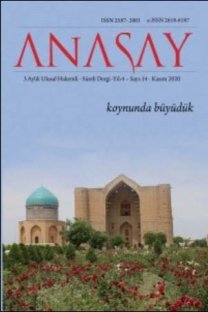SÖZLÜ TARİH ÇALIŞMALARINDA HAFIZA VE HAFIZAYI ETKİLEYEN UNSURLAR
Sözlü tarih bir teori olarak değil, bir yöntem olarak tarihin en önemli yönlerinden birisini oluşturmaktadır. XX. yüzyılın ortalarından itibaren tarihçiler geçmişle ilgili anılardan öznellik, hafıza ve anlatılar ile ilgili bir dizi teori geliştirmeye başlamışlardır. Bu yüzden sözlü tarih, yirminci yüzyılda insanlara karşı işlenen savaş zamanı dehşetlerin unutulmamasını sağlamada önemli bir rol oynamaktadır. Fakat bu önemli rol içerisinde sözlü tarih araştırması yapılırken sözlü kaynakların anlatılarını etkileyen bir çok unsur vardır. Sözlü tarih çalışan tarihçilerin bu unsurları göz önünde bulundurarak çok iyi değerlendirmeleri ve anlatılanların gerçeklik payını etkileyen bu unsurları farklı yönleri ile kıyaslamaları tarafsız bir çalışma yapılabilmesi açısından önemlidir.
Çalışmada sözlü tarih çalışan araştırmacıların ne gibi konulara dikkat etmesi gerektiği üzerinde durulmuştur. Ayrıca sözlü tarih kapsamında görüşme yapılan ve anıları derlenen kişilerin anlattıkları konuların gerçekliğinin tam olarak kavranabilmesi için göz önünde bulundurulması gereken hususlardan bahsedilmiştir. Ayrıca anılarına başvurulan kişilerin anlattıkları olaylarda etkilenebileceği durumlar açıklanmaya çalışılmıştır. Bunun için literatürde konu hakkında yazılmış temel kaynaklardan ve sözlü tarih çalışması yapan yazarların eserlerinden yararlanılmıştır. Sonuç olarak görülmüştür ki sözlü tarih araştırmalarında dikkat edilmesi gereken hususların başında sözlü tarih anlatıcısının hafızasını etkileyen fiziki ve ruhsal durumlarına dikkat edilmelidir. Çünkü bunlar olayların yanlış hatırlanmasına veya yanlış aktarılmasına neden olmaktadır. Bu yüzden tüm bu durumların iyice değerlendirilmesi ve sözlü tarih anlatıcısının vermiş olduğu bilgilerin bunlar ışığında değerlendirilmesi gerekmektedir.
Anahtar Kelimeler:
Anı, Sözlü Tarih, Olaylar, Hafıza, Şartlar, Hafıza ve Cinsiyet
MEMORY AND FACTORS AFFECTING MEMORY IN ORAL HISTORY STUDIES
Oral history constitutes one of the most important aspects of history, not as a theory but as a method. From the middle of the twentieth century, historians began to develop a range of theories about subjectivity, memory, and narratives from memories of the past. Oral history therefore plays an important role in ensuring that the wartime horrors committed against humans in the twentieth century are not forgotten. However, there are many factors that affect the narratives of oral sources while conducting oral history research in this important role. It is important for historians studying oral history to evaluate these factors very well and to compare these factors with different aspects, which affect the truthfulness of the narratives, in order to carry out an impartial study.
In the study, it was emphasized what kind of issues researchers working on oral history should pay attention to. In addition, it was mentioned what should be paid attention to in order to fully comprehend the reality of the subjects told by the people interviewed and whose memories were compiled within the scope of oral history. In addition, it was tried to explain the situations that the people whose memories were consulted could be affected by the events they told. For this, the main sources written on the subject in the literature and the works of the authors who made oral history studies were used. As a result, it has been seen that at the beginning of the issues to be considered in oral history research, attention should be paid to the physical and mental states of the oral history narrator that affect his memory. This is because they cause events to be misremembered or misrepresented. Therefore, all these situations should be evaluated thoroughly and the information given by the oral history narrator should be evaluated in the light of these
Keywords:
Events, Memory, Mind. Oral History, conditions, memory and gender,
___
- Abrams, L. (2010). Oral History Theory. Oxon: Routledge.
- Barber, S., & Peniston-Bird, C. (2009). History Beyond the Text. New York: Routledge.
- Green, A., &Troup, K. (1999). The House of History. Manchester: Manchester University Press.
- Hoffman, A. (1996). Reliability and validity in oral history. Ed. Dunaway, David, K. and Baum, Willa, K. Oral History; An Interdisciplinary Anthology. 2nd ed. (87-93). California: Altamira Press.
- Quinlan, M. K. & Sommer, B. W. (2002). Oral history Manual. Oxford: Altamira Press.
- Simon, R. (2005). I. The Touch of the Past. New York: Palgrave Macmillan.
- Thompson, P. (2000). The Voice of the Past. 3rd ed. New York: Oxford University Press.
- Yow, V. R. (2005). Recording Oral History; A Guide for Humanities and Social Science. 2nd Ed. Oxford: Altamira Press.
- ISSN: 2587-2001
- Yayın Aralığı: Yılda 4 Sayı
- Başlangıç: 2017
- Yayıncı: İshak KÜÇÜKYILDIZ
Sayıdaki Diğer Makaleler
DEDE KORKUT’TAKİ BAYINDIR HAN ÜZERİNE BİR DEĞERLENDİRME
SOSYO-KÜLTÜREL DEĞİŞİM SÜRECİNDE ALANYA YÖRÜKLERİNDE EVLİLİKLE İLGİLİ ÂDETLER VE İNANIŞLAR
İSLÂM TOPRAKLARINDA FRANSIZ BİR MÜSTEŞRİK: CHARLES MİSMER
Yusuf AKAN, Hümeyra SADAKLIOĞLU, Ayhan KORKULU
BİLİM İNSANI HATİCE ÖRCÜN BARIŞTA’NIN TÜRK SANATINA KATKILARI
IRAK’TA ARAP MİLLİYETÇİLİĞİ VE GENÇLİK ÖRGÜTLENMELERİ
Eda TEKİN, Muhammed Eyyüp SALLABAŞ
